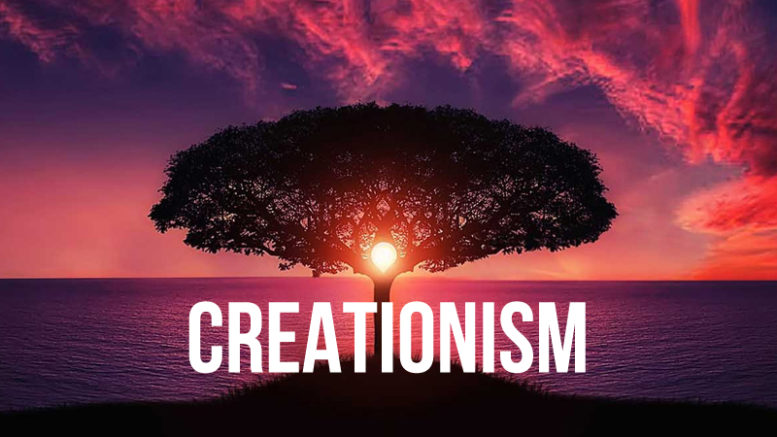Introduction:Young earth young earth creationism (YEC) and evolution have been in opposition ever since the latter’s introduction by Charles Darwin in 1858. Their conflicting views come as no surprise since young earth creationism (YEC) is derived from Christianity, while evolution is claimed to be derived from science. Christianity revolves around the concept of faith in Jesus Christ, and science revolves around the pursuit of evidence in nature. In light of today’s growing focus on science, it is essential to address the issue. Through this treatise, we hope to show that God is the true creator of all life on earth and that evolution is a biased and illogical explanation for the creation and sustaining of life.
We begin in Genesis, the first book of the Bible and the young earth creationism account. While Moses is credited as the literal author of Genesis, it was inspired by God. For this reason it is often called the “Word of God.” In fact, 2nd Timothy 3:16 states, “All Scripture is God-breathed and is useful for teaching, rebuking, correcting and training in righteousness, so that the man of God may be thoroughly equipped for every good work.” The scripture is perfect in its descriptions and explanations. It says precisely what God intended. Therefore, a literal interpretation of the Bible is in order.
What the Bible Says…
The opening line of Genesis says, “In the beginning God created the heavens and the earth” (Genesis 1:1), so we know that God is the Creator. God existed before anything else (Genesis 1:2). Chapter One describes God’s creative process. Over the course of six days, He created the universe, the earth, and everything on it. On the first day, God created light and separated it from the darkness. On the second day, God created the sky. On the third day, He gathered the waters beneath the sky and called them seas. God also produced vegetation on the third day. On the fourth day, God made the sun, the moon, and the stars. On the fifth day, He made all the creatures of the sea and sky. And on the sixth day, He created all the animals that would live on land. On the same day, He created man: “Then God said, “Let us make man in our image, in our likeness, and let them rule over the fish of the sea and the birds of the air, over the livestock, over all the earth, and over all the creatures that move along the ground” (Genesis 1:26). On the seventh day, God rested.
What Scientists Say…
Evolution is derived from Naturalism, which assumes that things made themselves. Naturalism suggests God had no part in the creation of life and assumes He has not attempted to share with humanity any information about the past.[1] At its core, evolution is the belief that “nothing” became “something.” Non-living matter developed into living matter. It assumes that “single-celled organisms gave rise to many-celled organisms.” It goes on to propose that “invertebrates gave rise to vertebrates, ape-like creatures gave rise to man, non-intelligent and amoral matter gave rise to intelligence and morality, and man’s yearnings gave rise to religions.”[2] Evolution is one of the major cornerstones of modern biological theory, taught in most school around the world. In Refuting Evolution, Jonathan Sarfati states, “The whole secular education system in America (and most other countries around the world) is underpinned by evolution.”[3] Many scientists believe in evolution because it is the most practical alternative to believing in Creation, which they consider too incredible.[4] Most scientists will also admit evolution is not a proven fact, yet they treat it as fact and teach it as fact. Ironically, evolution is just as faith-based as Christianity.
The Young Earth Creationism Rebuttal
It is important to understand several key principles:
-
-
First, “the scientific method is limited to the study of processes as they occur at present.” Science cannot speculate about past occurrences. It can only deal with “how,” “what,” and “where” questions. “When” and “why” are out of bounds.[5] Therefore, it is impossible to apply the scientific method to a concept like the Creation because it occurred so long ago.
-
-
-
Second, the word “science” means “knowledge.” Since evolution is rooted in science – or so scientists say – it would seem essential to “know” with all certainty that evolution is true. But no one has actually seen evolution occur. There is no actual “knowledge” of evolution. In The Modern Creation Trilogy, Morris and Morris write, “The changes we do see in living species are either “horizontal” changes, at the same level of organized complexity [or] “downward” changes (e.g., mutations and extinctions).”[6] There is no scientific evidence for evolution. Believing in evolution requires faith.[7] Ultimately, neither creation nor evolution can be proved or disproved through evidence. Both concepts occurred in the past, which the realm of science cannot touch. But young earth creationism (YEC) can be deemed the more logical faith.
-
-
Third, one must understand evolution is not a fact. There is a strong difference between the terms “hypothesis,” “theory,” “law,” and “fact.” A hypothesis is “a statement that can be tested scientifically by some kind of experiment that could refute it if it is wrong.”[8] A theory is a hypothesis that has been tested many times but hasn’t been refuted yet. And a law of science is “a theory that has been tested, with positive results, so often and in so many different ways that it is almost certainly a confirmed fact of science.”[9] However, many scientists are careful to confess that even a law could eventually be refuted. It is impossible to officially deem a law as absolute fact. Evolution should be called a theory rather than a law or fact of science.
“The Missing Link”
One of the strongest arguments against evolution is lack of evidence in the fossil record. Many evolutionists claim the fossil records prove evolution, but they do not. If evolution was the true process of creation and all living things developed from something else over time, there should be fossils that indicate their transitions. There should be fossils that depict creatures with “incipient eyes, [half-way wings, half-scales turning into feathers, and partially-evolved forelimbs].”[10] Morris and Morris make a valid point: “It seems very strange that the fossilization process selected only those individuals for preservation that already had completed particular stages of evolutionary progress, and yet preserved these in great abundance and variety.”[11] Billions of fossils have been preserved around the world, but none depicting transitional forms have been found.
The Miller Experiment
Another argument evolutionists often use against creationists is the Miller Experiment of the early 1950s. In this famous experiment, Miller “recreated” earth’s original atmosphere, and through electric stimulation, “naturally” created amino acids, the building blocks of life. The experiment was immediately publicized as a huge success and the first “proof” that life could have randomly formed on early earth by natural, rather than supernatural, processes. But Miller’s results have been severely misrepresented. For one thing, no one can know what earth’s original atmosphere was like. Miller claimed that oxygen did not originally exist on earth, so it was not included in the experiment, but isn’t it convenient that oxygen is deadly to amino acids? According to Mike Riddle, “…It is well known that biological molecules (specifically amino acid bonds) are destroyed in the presence of oxygen, making it impossible for life to evolve.”[12] According to most scientists, our planet has always had an abundance of oxygen.[13] Another problem with the Miller Experiment was the type of amino acid it produced. It is widely understood by scientists that biological proteins “use only left-handed amino acids.” The amino acids Miller created in his experiment were a mixture of left and right-handed; this combination is “detrimental to life.”[14] To say that Miller created the elements necessary to build life is more than a stretch; it’s a flat out lie.
Popular Views on Young Earth Creationism (YEC) and Evolution
Many people try to reconcile the Creation with evolution through theories that compromise God’s written word. Here are several of the most common theories.
-
Theistic Evolution
God created the universe, earth, and all forms of life through the process of evolution. This theory is also known as “Biblical Evolution.”[15]
-
Progressive young earth creationism (YEC)
Evolution has been the primary force in motion over the course of the geological ages, but, at times, God has intervened and created various things that evolution could not. God only gets partial credit for the Creation.[16] Progressive young earth creationism (YEC) is ultimately the same as Theistic Evolution.
-
Day-Age Theory
Proponents of this theory attempt to reconcile the geological ages with the six days of creation recorded in Genesis. Supporters of Day-Age Theory often argue about the meaning of the word “day” and propose that each “day” referenced in Genesis was actually thousands of years.[17]
-
Gap Theory
Gap Theory derives from scrutiny over the translation of several words in the opening passage of the Bible. Gap Theory asserts that God made Heaven and Earth, as it says in the opening passage of Genesis, but a long period of time followed His initial creation. Over time, the earth fell into ruin and became empty. Then, after this huge gap following verse one of Genesis, God recreated the earth in six days where verse two picks up.[18]
Theistic Evolution and Scripture
Theistic Evolution is not an acceptable theory for Christians to adopt because it is incompatible with the Holy Scriptures. God would never have used evolution to create the universe. As an omnipotent being, God is all-powerful and fully capable of creating the universe in a moment rather than over the course of thousands of years. God also created man in His own image and would not have waited for evolution to take place before giving people personalities. Additionally, God’s omniscience contradicts Theistic Evolution. God is a master planner. There is nothing random about His methodology. He is purposeful. He doesn’t waste time. If His ultimate plan was the redemption of man, why would He wait millions of years to fulfill it?[19]
Day-Age Theory and Scripture
Many Christians try to compromise the Creation by saying the word “day” cannot be taken literally. But the Creation did occur over the course of six 24-hour days (Exodus 20:8-11). The most common argument against six literal days is the meaning of the Hebrew word for day, yom, which “does not have to mean a literal day, but can be interpreted as “a very long time.” While this word clearly has parabolic or metaphorical implications, its literal meaning is clearly stated 95 percent of the time it is found in the Bible. Besides, others words or phrases are typically used in the Bible to describe a duration of time longer than a literal day, such as olam or yom rab, which means “a long time.” In addition, the writer of Genesis goes to great lengths to define the word “day” or yom within the specific boundaries of “evening and morning.” Genesis refers to the “first day,” the “second day,” and so on, further confirming them as literal, solar days.[20]
Gap Theory and Scripture
Gap Theory is incompatible with the Bible. It assumes a great cataclysm occurred during the gap between the first and second verses of Genesis. This supposed cataclysm had to occur in order for the earth to be in the ruined and empty state that caused God to recreate it in six days. Clearly, Gap Theory is an attempt to reconcile the Creation described in the Bible with the proposed geological ages. But “one cannot harmonize the geological ages with the Bible by eliminating them!” Any kind of worldwide cataclysm would have “completely devastated and disintegrated the sedimentary strata and the fossils that are used as the evidence proving the geological ages,”[21] and the Bible says nothing of any cataclysm before Noah’s Flood, so it is pure speculation.
Conclusion
While this discourse has only taken a cursory look at the information and research surrounding the debate between young earth creationism (YEC) and evolution, it has hopefully shed a little light on some modern misconceptions about evolution and its place in the world as “scientific fact.” Ultimately, Darwinian Evolution is merely a theory, and, although it seems rooted in science, it is actually rooted in faith.
It is crucial for Christians to understand the Creation and to accept it as truth, because the Creation story is the keystone of Christianity. If one does not believe in the Genesis account, why should they believe anything else the Bible says? The Creation is the foundation of the Bible, and it is imperative to the Christian’s walk with God that they believe in His role as the Creator.
[1]Jonathan Sarfati, Refuting Evolution (Green Forest: Master Books, 1999), 16.
[2]Ibid., 16.
[3]Ibid., 13.
[4]D.M.S. Watson, “Adaptation,” Nature, 124:233, 1929.
[5]Henry M. Morris and John D. Morris, The Modern Creation Trilogy: Scripture & Creation, Volume One (Green Forest: Master Books, 1996), 13.
[6]Henry M. Morris and John D. Morris, The Modern Creation Trilogy: Science & Creation, Volume Two (Green Forest: Master Books, 1996), 13.
[7]Ibid.
[8]Ibid.,14.
[9]Ibid.
[10]Ibid, 53.
[11]Ibid.
[12]Mike Riddle, War of the Worldviews (Hebron: Answers in Genesis, 2005), 18.
[13]Michael Denton, Evolution: A Theory in Crisis (Adler & Adler, 1985), 261.
[14]Riddle, War of the Worldviews, 20.
[15]Morris, The Modern Creation Trilogy: Scripture & Creation, Volume One, 36.
[16]Ibid, 41.
[17]Ibid, 42.
[18]Ibid., 50.
[19]Ibid., 39-40.
[20]Ibid., 43.
[21]Ibid., 54.




